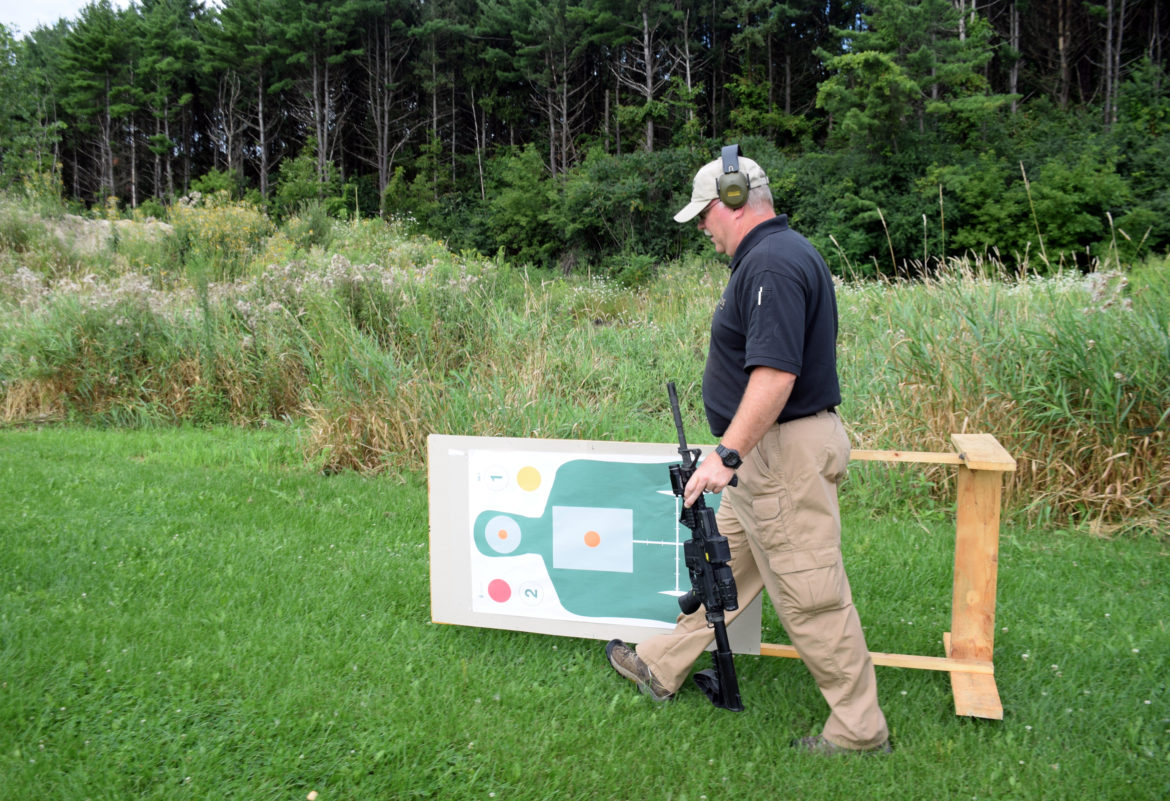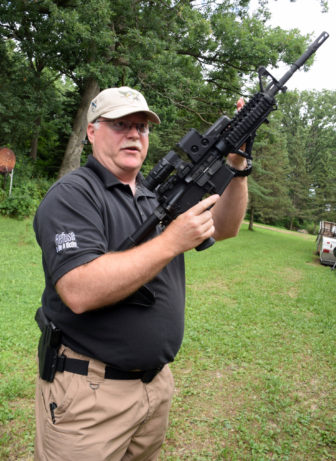Who Is Barred From Buying Guns?
And what are the federal and states law regarding background checks?

Curt LaHaise, a shooting instructor, former police offer, and an NRA member, is photographed at his shooting range in Deerfield, Wisconsin. LaHaise is the owner of “Guardian Safety & Security Solutions LLC”, which provides personal self defense training. Here, LaHaise takes a target out to the range to demonstrate shooting his AR-15. Taken on July 30, 2016. Photo by Alexandra Arriaga of the Wisconsin Center for Investigative Journalism.
DEERFIELD — Curt La Haise runs a shooting range 20 miles east of Madison where he teaches self defense and National Rifle Association-sponsored firearm courses. La Haise also teaches survival techniques and is a “prepper” who believes in being personally prepared for disasters.
Most of La Haise’s guns come from licensed dealers, which unlike private sellers are required to conduct background checks on buyers. He said he has no problem with the 18 states that have comprehensive background check laws that cover all buyers and sellers. But La Haise is skeptical such a requirement would reduce crime.

Curt La Haise is a shooting instructor, former police officer and a National Rifle Association member, seen here at his shooting range in Deerfield, Wis. La Haise is the owner of Guardian Safety & Security Solutions, which provides self-defense training. He holds a semi-automatic AR-15 rifle. Taken on July 30, 2016. Photo by Alexandra Arriaga of the Wisconsin Center for Investigative Journalism.
“Criminals will always get what they want to get,” he said. “Laws are for people that follow laws. Why should we make people who already follow laws follow more laws?”
His main concern is making sure that purchasers do not have to “jump through a bunch of hoops” or pay extra fees. He believes firearm sales should be “even” for all sellers.
“I don’t think criminals are buying their guns at gun shows, or through private sales legitimately,” La Haise said. “They’re buying them from another gang member.”
Allison Anderman, staff attorney at the Law Center to Prevent Gun Violence in San Francisco, which tracks and analyzes firearm legislation, said because of the private sale loophole, prohibited purchasers can get weapons through legal means.
Anderman acknowledged that gang members and criminals still may be able to purchase firearms, even with universal background checks.
“But,” asked Anderman, “why should we be allowing people to easily and otherwise lawfully acquire firearms if they are prohibited from having them?”
There are already laws on the books requiring background checks in some instances. The federal Brady Handgun Violence Prevention Act, which took effect in 1994, required licensed dealers to subject buyers of handguns to a background check before a sale is made. The law was extended to shotguns and rifles in 1998.
Who is prohibited from purchasing a firearm?
Under state and federal law, people prohibited from buying guns include anyone who is:
- Underage: Minimum age to purchase a firearm in Wisconsin is 18. To buy a handgun through a licensed dealer, the federal minimum age is 21.
- Convicted or charged with a felony or another crime punishable by imprisonment for more than one year or found delinquent as a juvenile after April 21, 1994 for a comparable crime;
- A fugitive from justice;
- An unlawful user of or addicted to a controlled substance or ordered to alcoholism treatment;
- Adjudicated as “a mental defective,” including anyone found to be insane, incompetent to stand trial, appointed a guardian or determined to be a danger to himself or others;
- Committed to a mental institution;
- An immigrant without legal status;
- Dishonorably discharged from the military;
- Has renounced his or her U.S. citizenship;
- Is subject to a court order restraining him or her from harassing, stalking or physically threatening an intimate partner or family member;
- Has been convicted of a misdemeanor for domestic violence.
What is the procedure for a background check?
For long gun purchases, buyers from a licensed dealer must fill out Form 4473, which asks about drug use, criminal history and mental health history. The dealer calls into the National Instant Criminal Background Check System, triggering an FBI search of several databases for potential prohibitions. The process happens within minutes.
Wisconsin is a point-of-contact state, meaning handgun dealers must contact the Wisconsin Department of Justice to conduct a background check to sell a handgun. Wisconsin’s DOJ is required to complete the check within five days.
Which sellers must be federally licensed?
Federal Firearm Licensees (FFLs) are individuals “engaged in the business” of selling guns. Applicants must go through a background check, safety training and testing to ensure they know how to handle weapons and are knowledgeable about firearms laws. Sellers who make “occasional sales, exchanges, or purchases of firearms for the enhancement of a personal collection or for a hobby” are not required to be licensed.
What is the private seller ‘loophole’?
There are no background check or record keeping requirements for private, unlicensed sellers. A private party may sell a firearm to a prohibited purchaser without committing a crime, unless the seller knows or has “reasonable cause to believe” the buyer is prohibited. It is still always illegal for a prohibited purchaser to buy a firearm.
Dee J. Hall and Coburn Dukehart of the Wisconsin Center for Investigative Journalism and Wisconsin Public Radio reporter Bridgit Bowden contributed to this report. It was produced in collaboration with Precious Lives, a two-year project investigating the problem of gun violence among young people, its causes and potential solutions in the Milwaukee area and statewide. Other partners in the project are 371 Productions, the Milwaukee Journal Sentinel, Milwaukee Public Radio 89.7 WUWM and The Voice 860 AM WNOV. Coverage by the Center(www.WisconsinWatch.org) of gun violence prevention issues is supported by The Joyce Foundation. The nonprofit Center collaborates with Wisconsin Public Radio, Wisconsin Public Television, other news media and the UW-Madison School of Journalism and Mass Communication. All works created, published, posted or disseminated by the Center do not necessarily reflect the views or opinions of UW-Madison or any of its affiliates.
-
Claire Woodall’s Plan to Restore Trust in Milwaukee’s Election Process
 Apr 8th, 2024 by Alexander Shur
Apr 8th, 2024 by Alexander Shur
-
Wisconsin’s Medicaid Postpartum Protection Lags Most States
 Feb 27th, 2024 by Rachel Hale
Feb 27th, 2024 by Rachel Hale
-
Wisconsin Has A “Smart Growth” Law To Encourage Housing, But No One Is Enforcing It
 Dec 22nd, 2023 by Jonmaesha Beltran
Dec 22nd, 2023 by Jonmaesha Beltran

















“I don’t think criminals are buying their guns at gun shows, or through private sales legitimately,” La Haise said.
60% of guns used in crimes across Illinois came from out of state. Criminals get other people to buy them at gun shows.
Here’s how they are getting guns. https://www.thetrace.org/2015/11/chicago-gun-laws-shootings-trafficking/
I have a hard time with the “laws won’t prevent bad people from buying guns” argument that the NRA and people like La Haise are always making. Why have any laws at all then? You can’t tell me there’s not a way to stop criminals from so easily getting guns without infringing on people’s right to bear arms. There’s hardly anyone who’s actually proposing we take people’s guns away. That’s just nonsense.
““But,” asked Anderman, “why should we be allowing people to easily and otherwise lawfully acquire firearms if they are prohibited from having them?””
Ms Anderman: if they “are prohibited from having them”, they can’t “otherwise lawfully acquire firearms”.
Hello? Is there anything inside? Don’t you understand what you just said? Prohibited people cannot posses guns. They cannot lawfully buy one, borrow one, possess one, use one. Possession is not lawful. Picking one up is a felony.
Straw buyers are NOT buying lawfully. As straw buyers they are committing FELONIES. Turning the gun over to a prohibited person is a felony, but so is the straw purchase itself. It is a Felony to buy for the purpose of turning the gun over to someone else.
Felony = It is already illegal.
What don’t you get about that?
Last week I had a talk with our plumber who was fixing our kitchen sink. He was a good guy and we started talking about gun laws and how they can help protect us. I wanted to outlaw guns and he definitely did not want that to happen. He believed the gun lobby was doing a good job of protecting our rights. He had an excellent idea that I had not heard before. Guns should be legal but could only be used for TARGET PRACTICE at a SHOOTING RANGE OR GUN CLUB or for HUNTING. The sale of guns should be limited to the types for these activities. I think we should be able to live with that.
How would that be implemented and enforced Rob? That seems impossible. You say the plumber is a good guy. Say he wants a handgun at home for self-defense. What’s your response?
The 2nd amendment had nothing to do with hunting or home/self protection. It addresses the need to have an armed population that can be called up to military service and use their own fire arm.
Several interesting comments and worthy discussion going on.
Casey, that’s not quite what the 2nd amendment says. It specifically says for the purpose ” of a WELL- REGULATED MILITIA” . Also, as I understand it, the current armed forces do not allow (or want) you to bring your own weapons. Napoleon figured out that it doesn’t work a long time ago. But vigilante groups (that definitely DON’T want to be ” well-regulated”) obviously need to!
Rob s friend has a really good idea though. Perhaps those problematic assault style weapons that are so effective at mass murder, but actually not practical in defending you house or property (unless you are a DRUG or WEAPONS LORD) could be confined to Regulated practice ranges overseen by military or police forces and their use expanded for military reservists and inclusive of other approved gun owners with appropriate training.
Finally, Penrod is missing the point of Anderson’s rhetorical question, which is that the Loophole absolves private dealers from doing any kind of background check, and only requires them to somehow “be suspicious”. So the question is actually “Why allow PRIVATE gun sellers to make sales that are otherwise lawful (meaning legal guns sold to people who can legally buy them) WITHOUT determining if the sale is ACTUALLY lawful?”, in direct competition with responsible, commercial gun businesses that can and do make sure? This loophole seems to facilitate Mr. Haise’s assumption that “criminals will always get [the guns] what they want”, when preventing just that is really the whole point of any legislation or policy under consideration. (I do not know any gun owners who WANT criminals to have an un checked source of weapons.
Questioning a concerned person’s intelligence is not appropriate. Asking for clarification in a polite way would help everyone arrive at a better understanding of the issue.
On that note, I m open to others’ comments and corrections. This is the kind of discussion our national leaders and candidates for leadership should be having: respectful, nuanced, open-minded. I salute all participants and people cited by this article.
Hi Steve: “So the question is actually “Why allow PRIVATE gun sellers to make sales that are otherwise lawful (meaning legal guns sold to people who can legally buy them) WITHOUT determining if the sale is ACTUALLY lawful?””
Allow them because the problem sellers/buyers will not comply with the law. They are criminals: That’s what criminals do. The only people who will comply with the law are those who are law-abiding, and they by definition are not a problem.
As an exercise: By what mechanism would such a law compel private sellers to do background checks? How would it work in practice? There are apparently (estimates differ somewhat) over 300,000,000 firearms in the US, with nearly a third of those added in just the last decade. By what mechanism would a law achieve such a high rate of compliance that it would be even more effective than our marijuana, heroin, and meth laws? Did Prohibition solve the stated drunkeness problem, or did it pile on all new problems of official corruption, organized crime, and widespread flouting of the law by otherwise law-abiding people?
Can you imagine that people who scrupulously obey laws might be offended by new and onerous laws which they believe will have no positive effect on the stated problem? Remember: such laws apply to all transfers, including lending a gun to an out of town friend who wants to go shooting with the owner. They apply to loans, gifts, rentals, across the board. They also apply to the return of those loans, gifts, and rentals. Imagine demanding that of car owners and car rental companies. Your out-of-town daughter comes to visit, and you have to do a background check on her in order to lend her your car? And she must do one on you to return it? Really? Think about that for a while, because that is what these so called universal background checks do unless they exempt family members, and if they do, they still do not exempt friends.
Like the constant proposals to ban ‘assault weapons’ when FBI statistics show under 300 homicides per year by all rifles* combined? There are several million AR-type rifles in America: why should anyone reasonable accept that banning them will be so effective that it will have any effect whatsoever on the homicide rate? Given that, why would anyone reasonable think that cutting homicides is the real intent of people whose professional area of expertise requires them to be aware of that data? I understand amateurs being mislead, but still being people of good will. I have considerably greater trouble understanding how professionals can not have some unstated motives and/or goals when their proposals would no effect whatsoever on their stated problem.
The same with universal background checks: Even if we had universal registration of all legally owned guns, the background checks would not be performed on the very guns we need worry about: those which are in illegal possession and transfer.
Source: https://ucr.fbi.gov/crime-in-the-u.s/2011/crime-in-the-u.s.-2011/tables/expanded-homicide-data-table-8
Penrod (post 2)
Yes, it is illegal for felons to possess or buy guns, but unfortunately it is legal to sell to them provided you sell via gun shows or websites like armslist.
Compare that to alcohol sales where all sellers (stores, restaurants, bars) are required to verify the buyer’s legality (age).
It should be a felony to transfer any gun to another felon. No exceptions.
There are 2 types of straw buyers:
• Those who buy at the request of somebody else
• Those who buy for resale at gun shows or on the web without having specific buyers lined up in advance.
The first type is illegal. The second type is not, but should be.
Post 7:
You ask what “By what mechanism would such a law compel private sellers to do background checks?”
How about a law saying that the last known registered gun owner is legally liable for any crimes committed with that gun? If I sell a felon a gun and he kills somebody with it, both of us should be tried for that murder. The only exception would be for a gun reported lost or stolen in a timely manner.
I wouldn’t think of selling my car to a stranger (or even a family member) without recording its new registration. Why can’t the same thing be done with guns?